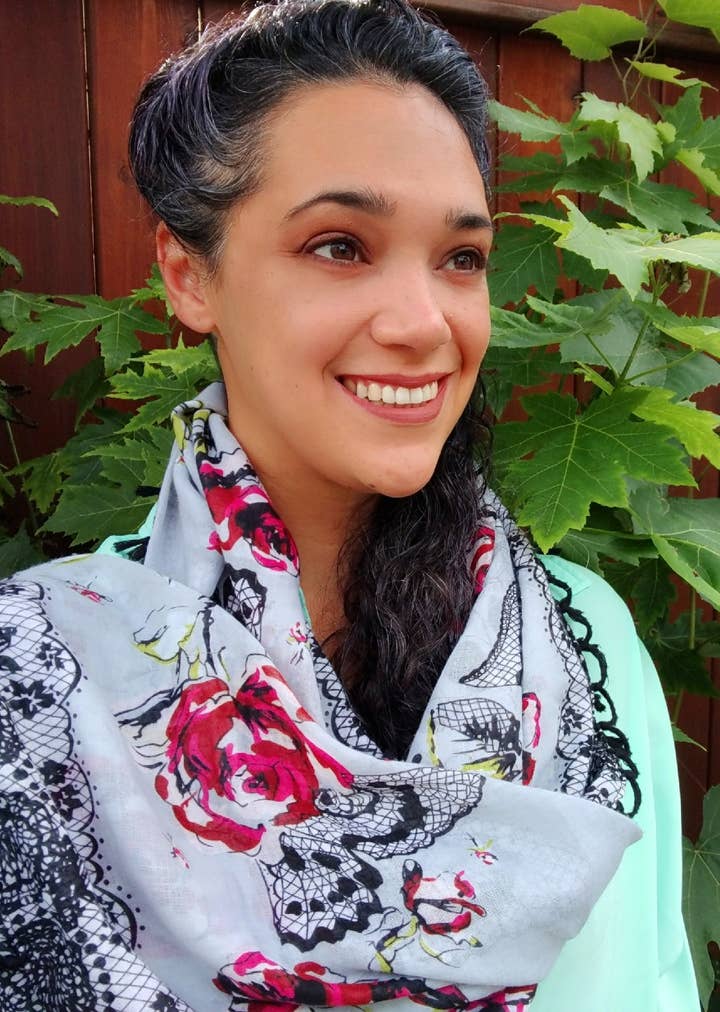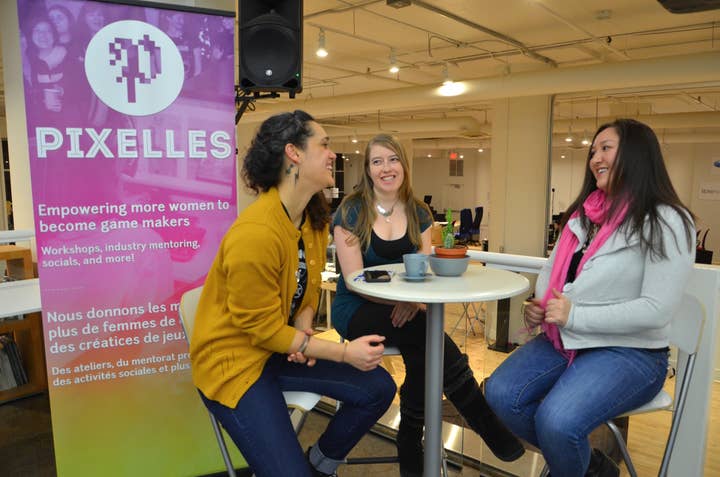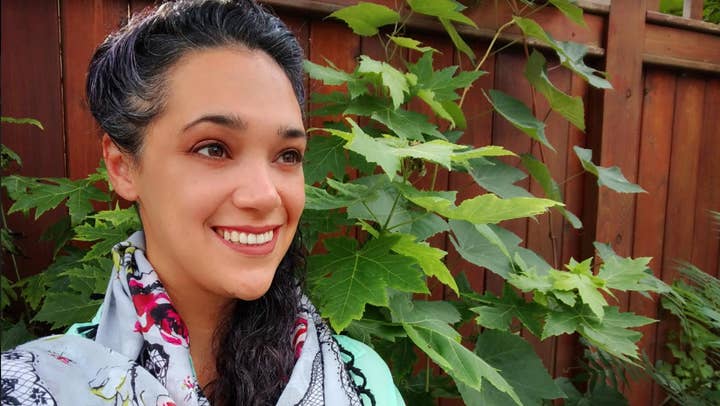Pixelles is helping mid-career mothers stay in games
We speak to co-founder Rebecca Cohen-Palacios about the organisation's efforts to do more than just bring new women into games
Women in games organisations are becoming welcomely common across the industry, as more and more professionals seek to address the gender imbalance seen across the global workforce.
Many focus on encouraging women, particularly young girls, who have yet to dabble in games development to consider it as a valid career path. However, some are dedicated to supporting established members of the community against the various barriers they face.
One in particular, the Montreal-based group Pixelles, has naturally transitioned from one to the other. Some of its most successful initiatives have helped women who are in the middle of their careers, and especially those who have children.

"There are tons of reasons why [people leave games] -- burnout, stress, moving to another industry," co-founder Rebecca Cohen-Palacios tells GamesIndustry.biz. "Being a parent is one thing. The demands of family, healthcare and your job, sometimes it forces people to choose one. Other times it's because they reach a glass ceiling and don't know where else to go.
"A lot of our mid-career support has come out of ourselves evolving as game developers and seeing this need grow along with how we grow. We did start out at the 'getting more people into the industry' part, but then you see this whole other issue and are like 'no one is filling in, we're going to go and do it ourselves.' That's why we've been pivoting to come and fill in those holes."
Cohen-Palacios describes Pixelles as a "mainly women in games organisation," in that while it focuses on women, the team also "try to hold open the door for other people as well." Offering mid-career support is part of the group's efforts to "fix the leaky pipeline, helping people stay happily and healthily in the industry," but it also wants to promote opportunities for people to use games as a form of self-expression without necessarily forging a career out of the medium.
The organisation is known for its Teacade networking events, as well as a Make Your First Game incubator -- "This is a skills incubator, not a business one," Cohen-Palacios emphasises -- and a GDC scholarship that brings people from underrepresented groups -- whether that's countries, genders or even parents -- to the annual conference.
The mid-career support program has aided more than ten mothers in the industry so far as part of a co-development program devised by co-founder Tanya Short.
"Just talking to another mother in the games industry about these shared problems is a big deal. We don't hear about being a parent in the same way we hear about being a woman"
"[This] brings together ten mid-career games developers under a theme," Cohen-Palacios explains. "Last time we focused on parents, or people who are expecting to be parents. We bring them together with third-party HR person who specialises in women's leadership and they just talk together.
"Just having another mother in the games industry and being able to talk about all these shared problems is a really big deal. It can be really isolating on a team sometimes, and in the industry in general. We don't hear a lot about being a parent in the same way we hear about being a woman."
Going back to work after maternity (or even paternity) leave has its challenges in any industry, but with the rapid pace of development -- plus the constant evolution of games technology and processes -- this can lead to a jarring return for some parents.
Cohen-Palacios notes that "from conversations I've heard between women and rising out of being in the same space together," one major challenge can be static salaries -- particularly if a parent has been off work for years rather than months. Salaries will often be the same as when they left, but the cost of living may have increased during that time, bringing into question whether it's actually sustainable to return to work. It's one of the many reasons why Pixelles is determined to help.
"Our co-development specifically targets mid-career mums, whether they left and are thinking of coming back or they're expecting to become parents some time in the near future, or they're currently a parent," says Cohen-Palacios, adding that the group's various programs and events have even managed to reach parents and mothers from other industries.
"We've even had a grandmother come in and make her first game in our incubator. We try to make these programs as accessible as possible to anyone, no matter who you are or what stage you're at."
When you look at the lifetime achievement honours handed out across the industry's myriad of awards, rarely do you see a female recipient. A few familiar names appear, such as Amy Hennig or Brenda Romero, but they are unquestionably the minority -- yet how can other women achieve such accolades if their career hits barriers mid-way through?

Pixelles has been running for six years now, having started in 2013. Cohen-Palacios recalls that she and her colleagues hadn't even planned to start an organisation, instead starting with a single iteration of its Make Your First Game incubator in Montreal.
"We started with ten slots, and received 65 applications for women to make their first game," she says. "We realised there was this huge need for women in games support in Montreal, and from there we've grown to our mentorship program, which matches an aspiring woman developer with someone in their desired field. They participate in a pen pal program where they can ask questions and get personal advice, ask the simple obvious questions that people are too nervous to ask because they feel it's a stupid question. There is no such thing as a stupid question, but you get self-conscious about asking the obvious thing. So providing this pen pal system makes it a little bit more approachable.
"There is no such thing as a stupid question, but you get self-conscious about asking the obvious thing"
"Every year, we've grown from there. We see a spot and we try to fill it. Coming out of our program, our participants wanted to give back. One of our second year incubator graduates, Jana Sloan Van Geest, wanted to see a writing program because she wanted to be a narrative designer, and she spearheaded our whole writing group program, which now hones writing portfolios for people who want to apply for writing jobs in the games industry. That has been such a success from a recruitment standpoint because we're seeing many of these women being hired directly out of our program.
"That's how we happen. We're kind of organic, we bring up new leaders to run the programs or give them the logistical support to run the things that they want to see happen."
Pixelles' reach has also grown. While the majority of events are focused on Montreal, the programs often have remote access. There are people as far afield as the Philippines and South America participating in the group's activities, while the GDC scholarship is open to developers worldwide.
As you might expect, all of this is run by volunteers. Cohen-Palacios is a UI artist at Bethesda, while Short runs indie studio Kitfox Games, and fellow director Stephanie Fisher works at the University of Toronto.
Cohen-Palacios would like to see more support for Pixelles and similar organisations from larger studios, whether that's financial contributions or even giving employees time off to volunteer for such programs -- "kind of like an in-kind donation in the form of employee salary."
The Pixelles co-founder would also like to see the conversation around women in games move on. It's still vital for young girls and newcomers to pursue a career in the industry, but it's just as important to recognise that this is just an option -- and games don't need to be a professional pursuit.
"A lot of these women in games articles talk about getting women into the industry, and it misses the completely valid idea of a woman or anyone trying out making a game or being in game development and deciding that it's not for them," Cohen-Palacios concludes. "That's also a valid step: exploring a medium, exploring something new.
"Also, games as self-expression -- you can go through all these programs and choose not to be in the industry, but use games as art or games as poetry. Those are also valid ways to explore being a woman in games. That's just someone expressing themselves, and some incredible and moving games come out of that. I want to see more of that."

